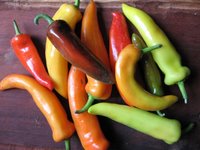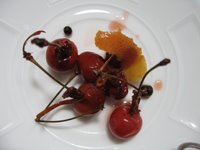
The ban on growing black and red currants is officially over! Actually, it’s been over since 1966, but I suppose being out of sight, out of mind for nearly a century makes for a slow resurgence. At $4 per ½ pint in the NYC Greenmarkets, they’re clearly back in vogue.
Cluster branches of vivid berries on a charcuterie board; toss them with a salad of wild greens, toasted hazelnuts, and Maytag blue cheese; or test their gleam alongside a glistening roasted chicken.
1 pint red currants
1 cup dry white wine (I used Lillet because that's what I had in the fridge)
1 cup Champagne vinegar or white vinegar
3/4 cup muscovado sugar or brown sugar
1/4 tsp. black peppercorns
A few allspice berries
1 bay leaf
1. Combine all ingredients except currants and bring to a simmer for 5 minutes.
2. Allow brine to cool, and pour over cleaned currants into a pint jar. Cover and refrigerate.
Yes, it really is that easy. Refrigerated pickles last for one year.





